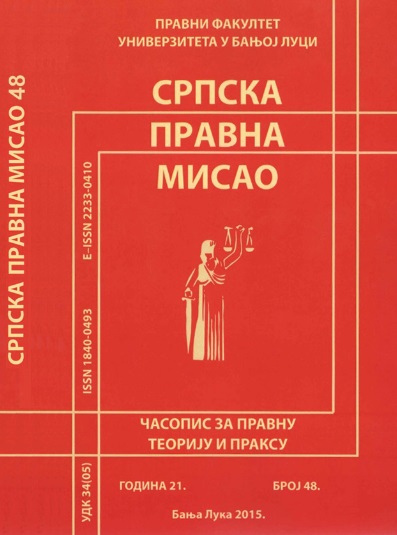Dr. Snežana Brkić CRIMINAL PROCEDURE LAW II third amended edition
Abstract
The Criminal Procedure Code of the Republic of Serbia from 2011, adopted in September 2011,1 was created as a result of over ten years long process of reform of the Serbian criminal procedure legislation - started with the adoption of the Criminal Procedure Code of the Federal Republic of Yugoslavia from 2001.2 New the code entered into force on the eighth day from the day of its publication in the "Official Gazette of the Republic of Serbia", and it has been applied since January 15, 2013, except in proceedings for criminal offenses for which a special law determines that the public prosecution of special jurisdiction shall act, in which case is applied from January 15, 2012. Thus, according to Article 6 of the Law on Amendments to the Code of Criminal Procedure from 2001,3 the investigation of criminal offenses for which a special law is determined to be handled by the public prosecutor's office of special jurisdiction, which was ongoing on the day this law entered into force, will be completed according to the provisions of the Code of Criminal Procedure from 2001 and the provisions of the Law on the Organization and Competence of State Authorities in the Suppression of Organized Crime, Corruption and Other Serious Criminal Offenses4 and the Law on the Organization and Competence of State Authorities in War Crimes Proceedings5 which were valid until on the date of entry into force of this law.6 However, in the meantime (and before the start of its full implementation) the 2011 Code was amended and supplemented five times7 and its full implementation began on October 1, 2013. In addition to all this, in September 2012, an official procedure was initiated to draft an amendment to the Criminal Procedure Code of the Republic of Serbia from 2011, and its draft was drawn up already at the end of 2012.8 These changes were subsequently abandoned. It is, therefore, not only about the complexity of the reform process of the criminal procedural legislation in Serbia, but also about a certain "wandering" in finding solutions that serve the basic goal of the reform - creating a normative basis for increasing the efficiency of the criminal procedure.
Downloads
Published
Issue
Section
License

This work is licensed under a Creative Commons Attribution-NonCommercial-NoDerivatives 4.0 International License.



